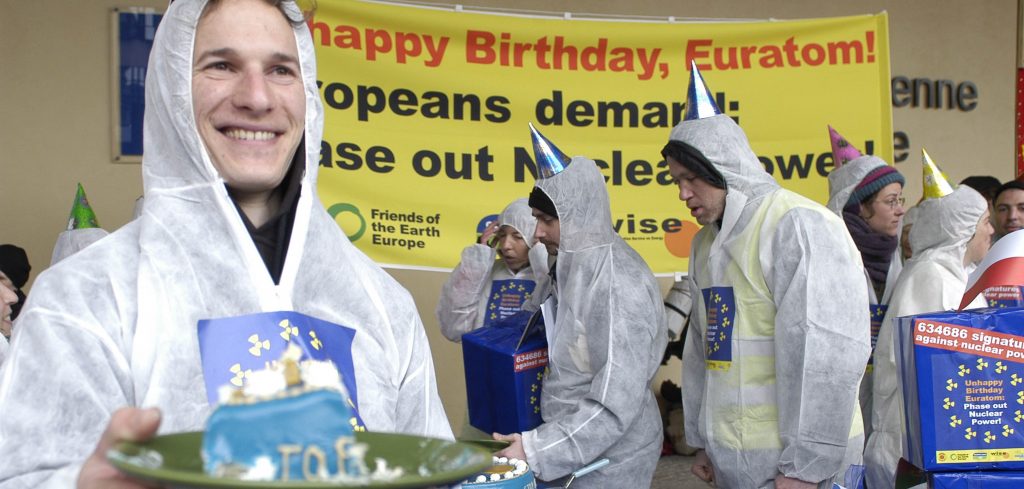Brussels, April 26, 2011 – On the 25th anniversary of the Chernobyl nuclear disaster, Friends of the Earth Europe stands in solidarity with the people of Ukraine and neighbouring countries, remembering those affected by the catastrophe. Friends of the Earth Europe also stands with those still affected by the tsunami and ongoing nuclear crisis in Japan – where the severity level of the nuclear crisis has been raised to maximum, on a par with Chernobyl [1].
The Chernobyl catastrophe is still a reality [2], and nuclear power remains more than ever a threat to people and planet – a fact driven home by the unfortunate events in Japan. Friends of the Earth Europe calls on European governments to start phasing out nuclear power across Europe, and calls on national authorities in the Ukraine and Japan do everything possible to prevent the immeasurable damage to people, the environment and the local ecosystem that further radioactive leaks will cause.
Pavlo Khazan, climate change and energy campaigner for Friends of the Earth Ukraine, says: “People in the Ukraine are still suffering 25 years after the nuclear catastrophe at Chernobyl. The events in Japan highlight that nuclear accidents on a scale of Chernobyl can happen again, and that no matter how prepared, there are risks with nuclear power – with disastrous consequences for people and planet. My generation saw the beginning of the nuclear threat, and I hope we will see its end.”
Friends of the Earth Europe calls upon the European Commission to demand a genuine, open process to bring about the end of the nuclear age in Europe [3]. The only safe and secure form of energy is that which harnesses clean, renewable resources, or the energy we save through increased energy efficiency.
Magda Stoczkiewicz, director of Friends of the Earth Europe says: “Twenty-five years on from Chernobyl and in the light of the ongoing nuclear crisis in Japan, one thing is clear – nuclear power will never be safe. European leaders must take note and push for the phase out of nuclear power across Europe.”
“Europe’s energy future must be based on renewable and energy savings. Europe can secure its energy supplies, reduce its dependency on fossil fuels and cut emissions, without relying upon unsafe and costly nuclear power.”
Resistance against nuclear power, and for the right energy solutions, is growing across Europe. Anti-nuclear demonstrations, and solidarity actions with the people affected by Chernobyl and the nuclear crisis in Japan, take place today across Europe. Twelve mass demonstrations yesterday across Germany brought over 120,000 thousand people on the streets. [4] Over 1,500 gathered in Brussels, Belgium.
NOTES:
[1] http://www.guardian.co.uk/world/2011/apr/12/japan-nuclear-crisis-chernobyl-severity-level1 [2] Twenty-five years after the explosion of the Chernobyl nuclear power station, in Ukraine, the reactor is still leaking radiation. The concrete shield built around the site is cracking, and only officials are allowed to visit the 30km security zone around the reactor. Millions of people still live in areas affected by radiation. [3] This must include a moratorium on new reactors, and the discontinuation of export of reactors. The most dangerous reactors must be identified throughout Europe, specifically taking into accounts threads such as earthquakes, floods, terrorist attacks, power blackouts and out-dated reactor designs.Countries should immediately prepare scheduled plans to close down these high risk reactors as soon as possible and outline how to replace them through energy savings and renewable development. The EURATOM Treaty must become a phase out plan for nuclear and should no longer finance nuclear industry, and transparency surrounding nuclear safety reports must be ensured [4] http://www.bund.net/nc/bundnet/presse/pressemitteilungen/detail/zurueck/pressemitteilungen/artikel/120000-menschen-bei-anti-atomprotesten-am-ostermontag-alle-akws-endlich-abschalten/





